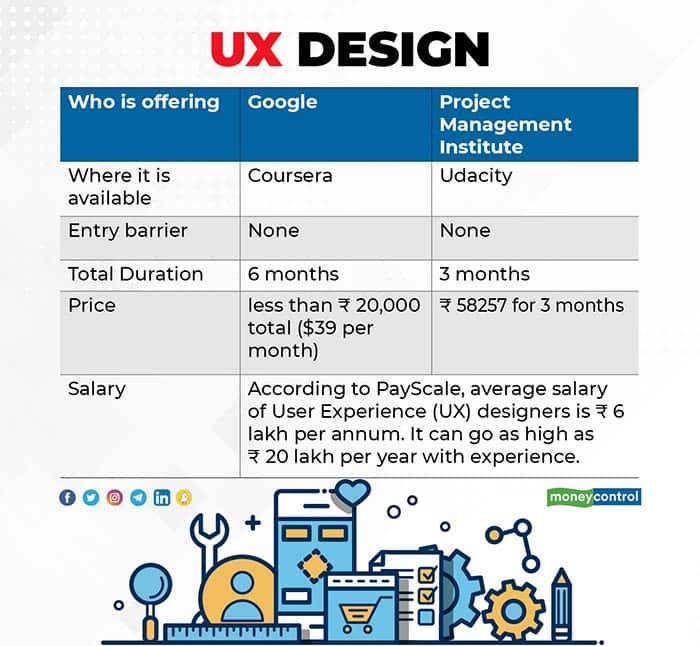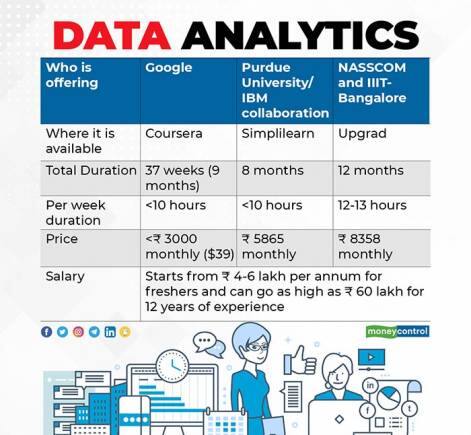



On March 11, 2021, Google said it was launching career certificates in skills such as android development and data analytics. On the face of it, this move has the potential to disrupt the hiring landscape.
For one, we are talking about Google, which has thrived on disruption. For another, the tech giant has launched the programme for less than half the price charged by competitors. It has also promised jobs at 130 top firms including Infosys, Accenture, Intel, Snap Inc and of course itself in the US, as CEO Sundar Pichai said in a blog last week.
Nonetheless, the shift from degrees to expertise—enticing it may well be—has long been debated without much headway. Besides Infosys, will other Indian companies bite? An earlier programme on these lines by Google didn’t make much headway. These are early days, but we take a look at what Google’s fresh stab at changing the future of hiring truly means.
What is on the table?Google, as a part of its ‘Grow with Google’ initiative launched enrolment for Google Career Certificates in key areas such as data analytics, user experience design and project management in partnership with Coursera. In addition to these three, IT support certification was launched in 2018.
All these at a cost of $39 per month by subscribing to Coursera, whereas the new certificate training material for Android developers is free with an exam fee of about $149.
The company will also offer 100,000 scholarships to applicants through non-profits, workforce development boards, and other community organizations such as Per Scholas, NPower and Goodwill in the US.
Along with the initiatives came the announcement that Infosys would hire 500 people with the certificates in the US. Another firm Better.com said that it would hire 2,000.
These initiatives will soon be expanded to India. “In India, we’re working to make certificates more accessible and launch an employer consortium,” Pichai said in the blog. Google did not respond queries on the timeline or the nature of scholarship it would offer.
But the premise is clear. The emphasis would be more than skills rather than the degree, a dramatic shift necessary to make the job landscape more inclusive and democratize the opportunity.
What does it mean for India?Industry veterans Moneycontrol spoke to said that when this is implemented in India, these certifications would indeed bridge the gap in skills, one of the biggest challenges companies are facing in the country.
Every year, over 15 lakh people graduate from over 6,000 engineering and technical institutes but less than a quarter of them are employable, according to industry estimates. The skills gap, evidently, is huge and the traditional education system is unable to solve the employability problem fast enough.
For IT firms, one of the largest employers in campuses, the challenge of finding the right talent has never been this pronounced with demand far outstripping the supply.
R Srikrishna, CEO, Hexaware, said in a recent interview to Moneycontrol, “We are at a point where we cannot keep up with demand.” The company is aggressively hiring talent in new-age technology areas like cloud, user experience design and data analytics, a trend seen across the IT firms.
Krishna Kumar, CEO, Simplilearn, an ed-tech platform, said he had not seen such demand for skilled people in the last 20 years. The company, which employs 15,000 people, has 150 vacancies for technology roles that it is unable to fill, he said.
This is the gap that online course providers, ed-tech companies and now Google are trying to bridge.
Google ImpactRamkumar Ramamoorthy, former Cognizant India chairman and Pro Vice-Chancellor for Professional Learning, Krea University, said, “With the kind of massive structural shift happening across industries (often driven by digital technologies) coupled with the velocity of change, continuous upskilling of the workforce as well as job readiness of first-time job seekers is the order of the day.”
Ramamoorthy explained that this is solved by nanodegrees and certificate programmes offered by technology majors like Cisco and IBM, and online open course providers like Coursera.

“This Google program is also a good example of that. The icing on the cake is Google partnering with a consortium of recruiters who could evaluate and hire these professionals with these credentials,” he added.
This partnership with employers is important. As IT firms across the country ramp up campus recruitment and lateral hiring, they have also strengthened partnerships with online education firms.
Take for instance, online education platform Great Learning that works with over 500 companies for placements. “Over the last six months, we have also been witnessing a significant increase in the number of corporates who are engaging with us to hire talent from Great Learning programs,” its co-founder Hari Krishnan Nair told Moneycontrol.
This can accelerate. “In India, with a million people entering the workforce every month, if technology giants such as Google were to offer such programs with a consortium of recruiters in tow, it will be a game changer for revving up economic growth, driving greater inclusion, and more importantly, becoming a skills powerhouse of the world,” Ramamoorthy said.
But not everyone is convinced, given how Google’s 2018 programme on the IT Support certification did not bring the impact it desired.
Why did its 2018 certification programme fail to take off?Google launched its first career-certificate programme in 2018. Back then, the employers were not convinced about the course and did not deviate much from the usual hiring mode, according to HR consultants.
A recruitment consultant from Delhi explained that one of the reasons was that there was no tie-up with companies for people to pick this certification. Also, the IT support certificate programme was not considered comprehensive enough, the consultant added.
"There are benefits to it, no doubt, from an upskilling perspective. But the number of hires via this mode was low,” said the head of a mid-size staffing firm in Bengaluru. Google did not respond to queries about its 2018 programme and how 2021 is going to different. However, experts added that with the promise of a career, the company now has better chances of making it work.
Will 2021 be any different?The latest move may find more success but is unlikely to immediately disrupt the education system, as companies will prefer to wait and watch, before they implement this at scale.
Infosys' HR Head Krish Shankar in a recent interaction with Moneycontrol that the company will first see how the program goes in the US before exploring India for hiring Google Career Certified graduates.

Hiring consultants agree. Kamal Karanth, co-founder of specialist staffing company Xpheno said that an engineering degree would continue to be crucial.
“All these IT/technology companies have already set in intake criteria and salary for them to position with their global customers. These global customers have outsourced their work to a third-world country and the pricing is based on the fact that they are engineers. Qualification, skills and experience decides the payment,” Karanth explained.
While one can bring certifications for data analytics or user experience design, replacing qualification with this metric may require a global overhaul, he added.
There are possibilities for the certification to be integrated with traditional courses. Aditya Narayan Mishra, CEO, CIEL HR Services said that there could be a process wherein instead of doing a four-year engineering course, an individual could do a few modules of engineering and top it up with such certification.
Additionally, it could complement degrees rather than replace them. For example, people who graduated from engineering in say 2010 or 2011 may not have gained knowledge on cloud computing or AI/ML during their course. It makes sense for such professionals to undergo a professional certification like the one offered by Google to fill the skill gaps.
“But can this certification replace a professional degree for a technical job? The answer is no,” said a professor heading the electronics engineering department at an IIT.
Large IT firms like Infosys, TCS, Wipro and HCL together hire close to 95,000 college students every year. “Yes, some certified professionals could get hired but technical talent (engineers) will continue to be the primary hires. The core engineering hires cannot be replaced by certification holders. Think about it. Will an aviation company hire someone who has studied a certificate course or will they hire an aerospace engineer? The answer is simple,” said the vice chancellor of a large technology institute in West Bengal.
The India problem
Sarita Digumarti, Co-founder, Jigsaw Academy, an ed-tech firm, said, “This is because the problems India has, are different from the West.”
Education system in India is focused on theory rather than application of it. So the Class 12 graduates and engineers lack logical reasoning and problem-solving skills that form the foundation in schools in countries like the US.
Also unlike the West, India is facing a supply-demand paradox. Countries like the US or Europe are facing a talent crunch and having these certified people will help them bridge the gap immediately. But in India, we have more supply of engineers who are not employable than needed but at the same time there are not enough who are qualified to fill these positions.
So, if there is a choice between engineers with a degree in STEM, and a Google Certificate, and the rest with only certificates, chances are that companies will choose the former instead of the latter, industry experts pointed out.
There is also an issue of access, if the aim is to provide a level playing field. Online courses assume that everyone can understand English and will have access to quality internet. “A lot of smaller towns do not have access. So, reach is also an issue,” Digumarti said.
Google did not respond to Moneycontrol’s query on whether the company will offer these courses in local languages. Currently the courses are available be Spanish and Portuguese apart from English.
So, the lack of wider reach and mindset change will continue to be a challenge for the programme to be a success.
But for the existing players, entry of Google is definitely a competition, albeit a healthy one, say the ed-tech players. According to Digumarti, with a big name like Google, it does help increase the standard of the ecosystem as they compete with the giant in offering the courses.
However, it is too early to say how or if at all Google’s entry will impact the way people hire talent. Simplilearn’s Kumar said that with massive shifts required to change people’s mindset, it will probably take decades before we can see an impact.
Maybe, as XPheno’s Karanth pointed out, if Google India takes the first leap and says we will hire based on certifications and not based on engineers, it will encourage others to do the same.
Discover the latest Business News, Sensex, and Nifty updates. Obtain Personal Finance insights, tax queries, and expert opinions on Moneycontrol or download the Moneycontrol App to stay updated!
Find the best of Al News in one place, specially curated for you every weekend.
Stay on top of the latest tech trends and biggest startup news.